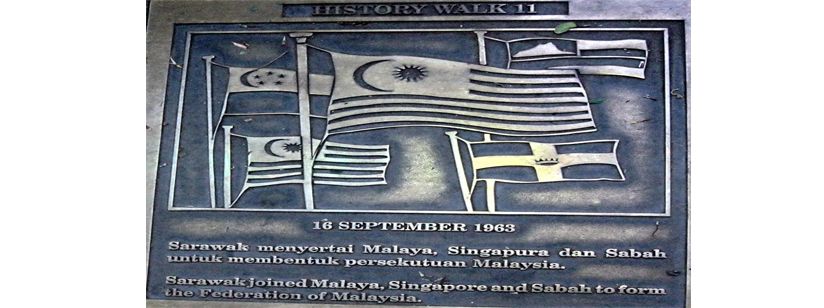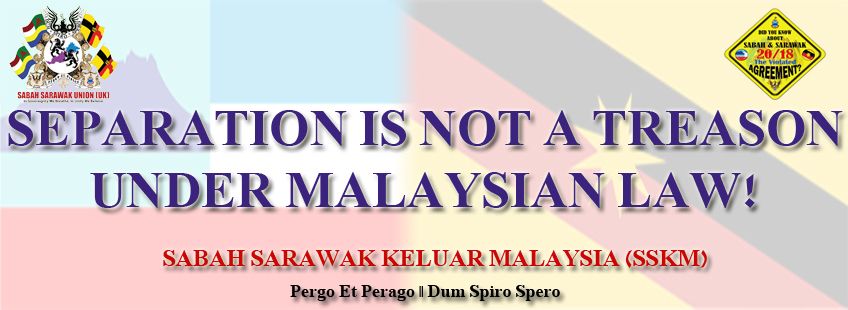Another word - Secession is our right.
=====================
Point 7: Right of Secession
There should be no right to secede from the Federation.
======================
We should take a positive view of the "no right to secede" initiative, which is worth considering despite its affirmation in Point 7 which speaks of the Sabahan and Sarawakian rights to secede from the Federation of Malaysia This is so because “the use [by Point 7] of the word ‘’should’ (as opposed to the word ‘shall,’ for example) turns the option of "NO RIGHT TO SECEDE" into a mere recommendation.”
You see.. Diplomatic documents often demand close linguistic analysis. Would that Point 7 have meant something else, had it said that “There SHALL be no right to secede from the Federation.”?
Since the auxiliary verbs “shall” and “shan’t” have all but disappeared from American English, in much of Great Britain they are still in common use. The facts that the 18/20 Points Agreement was an Agreement relating to Malaysia between United Kingdom of Great Britain and Northern Ireland, Federation of Malaya, North Borneo, Sarawak and Singapore, it’s British usage that counts — and when it comes to that, what greater authorities do we have than the estimable Fowler brothers, F.G. and H.W., whose “The King’s English” (first edition published by Oxford University Press, 1906) served generations of perplexed English speakers as a revered guide. Here’s what “The King’s English” (traditionally known as “Fowler”) has to say about “shall,” “should,” “will” and “would” in a discussion that is 20(!) pages long:
“It is unfortunate that the idiomatic use [of these words], while it comes by nature to southern Englishmen (who will find most of this section superfluous), is so complicated that those who are not to the manner born can hardly acquire it; and for them [this] section is in danger of being useless. In apology for the length of the remarks it must be said that the short and simple directions often given are worse than useless. The observant reader soon loses faith in them… and the unobservant is the victim of false security."
Needless to say, this is highly reassuring! Fowler then opens its discussion with the following short and simple directions: “Roughly speaking, should follows the same rules as shall, and would as will.”
In their pure form, Fowler continues, "shall" and "should" express command or obligation, whereaswill and would express intention or prediction, the difference between the two members of each pair being that the second is the conditional form of the first. Hence, “There SHALL be no right to secede from the Federation.” would indicate that Sabah & Sarawak is commanded NOT TO SECEDE FROM THE FEDERATION unconditionally, whereas “There SHOULD be no right to secede from the Federation.” indicates that this command is SUBJECT TO A CONDITION (or CONDITIONS) — in this case, presumably, that SABAHAN & SARAWAKIAN wish “to continue being part of the Federation”
Would such a reading of my argument, if it is the correct one, turn POINT 7 into a “mere recommendation” that SABAH & SARAWAK continue to be part of the Federation of Malaysia when there is no reasons/causes to trigger their need to SECEDE FROM THE FEDERATION?? If POINT 7 intends to say that SABAH & SARAWAK need not secede from the Federation unless it wants to, then it also intends to say that SABAH & SARAWAK need not continue to be part of the Federation of Malaysia unless it wants to — a construction of POINT 7 that would be rather bizarre, to say the least.
True, in practice, as opposed to theory, the difference between “shall” and “should” in British English is somewhat different: “shall” often expressing a COMMAND on the speaker’s part, and “should” merely a DESIRE, as in “You shall go to the doctor” vs. “You should go to the doctor.” And yet if we paraphrase POINT 7 as saying, “The Point 7 of the Agreement of Malaysia desires that Sabah & Sarawak not to secede from the Federation,” is this significantly better for Sabah & Sarawak? How big an improvement over flouting the POINT 7’s command would be flouting the POINT 7’s desire??
In short, if we take consideration of the above arguments on the reading of POINT 7, the FEDERATION OF MALAYSIA should politely be told in the king’s English, “No, thank you.. we SABAHAN & SARAWAKIAN wish to SECEDE from the Federation.”



























































